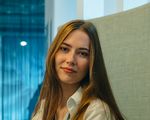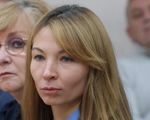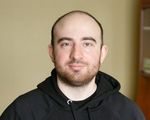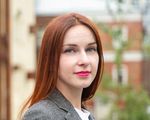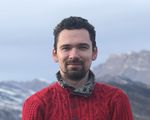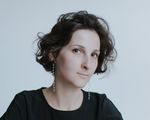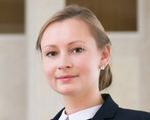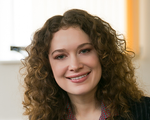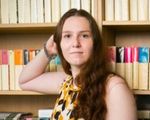About Success Builder
How do you find your place in life? How do you find something to do that both comes naturally to you and makes you happy? The answer is that you have to apply the knowledge you’ve gained from university and from life itself correctly. The Success Builder Project features HSE University graduates who have discovered themselves through an interesting business or an unexpected profession. The protagonists share their experiences and lessons learnt and talk about how they’ve made the most of the opportunities they were given.
Through her work, Polina Chernomordik — graduate of the HSE WEaIA Faculty and trainer of the Lightning Process technique — gives new meaning to the concept of success. After all, only the ability to identify and live by your own values — and not doing what everyone else does — enables you to develop in your profession and as a member of society. Ms. Chernomordik also knows how NGOs work in Great Britain, the purpose of a good education, and why we chase after phantoms even though inner peace is more important than career.
Why did you go to Moscow for your second degree after receiving your first in Perm?
I understood while studying management that an education in business was not for me. Ever since childhood, I have had an acute sense of justice: I wanted to help people, save the world and make life better for everyone. I dreamed of working for the UN. I read articles about politics and took part in charitable initiatives, many of which I initiated. After learning about the International Affairs programme at HSE in Moscow, I decided to apply: it offered a global perspective in not just the humanities, but also in humanitarianism. Political economy, philosophy and even Protestant ethics all concern the individual, and that is exactly what I wanted to study.
Why do you have such a strong interest in humanistic values?
As a child, I was keenly aware that not everyone was as fortunate as I was and that some children have no parents at all. My social studies teacher in school, Pavel Mikov, grew up in an orphanage. (He is now the Human Rights Commissioner for the Perm region.) While I was of school age, my family worked with Kidsave International, an organization that helps foreign families adopt children. I remember being embarrassed to talk about what I do and why I care. But now, I understand how lucky I was and I realized at an early age what makes life worth living.
As a child, I dreamed of studying and becoming a philanthropist, but to begin with, I just found like-minded people on the Internet. We created the Circle of Light charitable organization dealing with issues related to orphans. We started by organizing holidays for the children and bringing them things. Then we understood that just entertaining them would not solve the bigger problems. So we developed ‘smart assistance programs,’ including training for orphanage employees. Now I am most involved in the financial side of the organization, but also provide advice and moral support.
Did graduate studies meet your expectations?
It was clear that the things I was doing were important from an ethical point of view, and there was definitely a more democratic atmosphere at the Moscow HSE campus. The academic supervisors of my master’s programme drank tea with us at the seminars and spoke to us as equals. It didn’t have the authoritarian approach that characterized the HSE campus in Perm at that time. In this sense, the instructors in Moscow were really ‘cool’: it was interesting not only to study various subjects with them, but also to discuss whatever topic came up. In general, the programme takes you to a level where you can think about the world globally and understand the logic behind social and political processes.
How did you manage to win the prestigious Chevening scholarship (the international scholarship system of the UK government – Ed.) and how did it affect your career?
During my master’s studies, I began interning for the UN. It was not very inspiring: it turns out that the UN is a bureaucratic structure with loads of internal problems. Later, I took a job working for the Perm region government. The region held important forums and started some great development projects. I wanted to receive an education in public administration. I began preparing for Chevening and, when I won the scholarship, went to London. That was a one-year master’s course after which I stayed on to work for a charitable organization.
Was that a continuation of ‘international relations’?
There is a paradoxical idea: you need an education in order to definitely put it to direct and practical application. I think this concept is becoming obsolete.
A good education makes you capable not only of integrating into the system, but also of creating and managing new systems
That is, the graduate’s task is not only to find a good job, but also to create the type of society that would provide such jobs. You become more astute, begin to see cause and effect relationships, construct a logical progression of actions or ideas, and learn to communicate and link the right things effectively — and you can apply these skills in any area. I have always pursued very different lines of action, and everything I’ve learned in the process has been very useful and helped me to understand the world.
What did you learn from your work with the charitable organization in London?
I had heard that it was incredibly difficult to find work in London, but I landed a job in just two days. I was hired by an organization that lobbies on behalf of people with genetic and rare diseases. They gave me three months to organize a small conference for professionals in that field. To my knowledge, Russia has no such organizations that advocate certain healthcare policies at the government level, as compared to targeting assistance for specific populations. There is a practice in Great Britain, however, by which charities form around particular problems and the government often supports them because they are the ones who know how best to organize healthcare in the country. And these charities can sprout up in connection with the most narrowly focused medical issues. For example, the organization Jnetics deals only with genetic diseases afflicting Jews. No matter what happens, and however rare the disease, there is always a support group or association devoted to it.
We received a large grant from the UK National Lottery Fund for the conference, and it was so easy to organize that it was even boring. I was used to the way they do it in Russia where you’re given just a couple of weeks and no budget at all to put together a forum for several thousand participants. Such challenges give you a sort of adrenaline rush. In Britain, all the speakers are approved one year in advance, every detail is worked out and you have loads of assistants. On the day of the conference, it was suggested that I make a list of employees who could take on additional communication with speakers and various administrative issues. I was surprised. Why shouldn’t I do all that? ‘We don’t want you to feel stressed,’ my colleagues answered.
It must be great to have such working conditions! Why did you leave London?
For new opportunities. I wanted to try working somewhere else, so I went to Mexico. With the help of friends from Chevening, I found a job with a state agency providing social services to senior citizens. I tried that for a few months, returned to Moscow, understood that this was not where I wanted to be yet, and one week later left for Macedonia to undertake yet another social challenge. There I worked for an NGO that was also a consulting organization helping with national development projects. I helped with media and looked for grants. For example, we did a cultural and educational project to develop a region with a gypsy population. That was a very interesting social experience, but it would have been a mistake to stay there: it takes such gargantuan efforts to change anything, and looking back now, I see myself as a completely different person.
What do you think is missing from the educational programme for international relations?
The human factor is almost never mentioned. Maybe a particular political leader behaves as he does because his mother mistreated him as a child. In my current work, I study the human mind and how it forms patterns of behaviour. This provides much deeper insights into everything that happens in the world. For example, I think that, as a child, Trump formed a grudge against the whole world and wants to prove to everyone that he is important and essential. If to approach politics in this way, our thinking can grasp global processes much better. The ‘human factor’ often underlies political decisions because politicians are also just people.
I think this point of view should be used in educational programmes, in international relations, and in other areas as well. One very interesting study looks at factors contributing to personality formation among British politicians who studied in private schools. For example, private British schools teach future leaders to be competitive: they must be active and contending all the time. All of this distorts their perception of the world and then spills over into political behaviours that do not fit the paradigm of happy societies. In my opinion, by looking at international politics in this way, we can form more objective and productive views.
What prompted you to make such a radical change in profession?
Only a couple of weeks after finishing my last project in Macedonia and returning to Russia, I had interviews with government ministers. These were for the Forum analytical center that consults the government on various issues. I had always adjusted to changes and adopted to new environments quickly, but the climate, the reverse culture shock and the emotional stress did the trick: I got sick. It seemed like a common cold, but I couldn’t knock it. I went to the doctors and had various medical tests run, but nothing helped. I had trouble getting out of bed in the morning, felt too weak to move, and my eyes hurt like crazy.
The doctors assigned different diagnoses: dysautonomia, immunodeficiency, chronic fatigue syndrome, etc. I undertook an independent study of the English-language research and forums on the subject and concluded that what I had was, indeed, chronic fatigue syndrome. The doctors couldn’t help me, so I began searching for alternative treatments. Then I read about a training programme that helped establish the proper connection between the brain and body. After a long and painstaking analysis, I chose the Lightning Process. This programme has helped thousands of people around the world recover from mysterious illnesses, including chronic fatigue syndrome. As someone with a scientific background, I also liked the research conducted as part of this programme and the overall academic approach to addressing the issue. I went to London, did the Lightning Process training and began applying it. Two months later, I was completely healthy.
And now use those skills not only for yourself, but to treat others as well?
When I studied forums for various ‘incurable’ ailments such as chronic fatigue syndrome, I found that they were made up of huge numbers of sufferers. Once I recovered from my problem, I wanted to help others. I also realized that emotional or physical stress is a major contributing factor, and chronic stress can trigger disturbances in the immune system and other physiological processes. I returned to London and studied for one year under Phil Parker, the scientist who developed the Lightning Process technique, to earn my license and get certified. I first received a degree as a ‘life coach,’ and then as a hypnotherapist, and finally as a Lightning Process trainer. I have been conducting seminars in Moscow since the fall of 2018.
Are you the first person in Russia to hold such a license?
Yes, and this is a great privilege. Everything worked out in the best possibly way — my training was in London where I speak the language fluently, I understood the process thoroughly as someone who had overcome her own illness, and I am a very sociable person and am a firm believer in the scientific method. It made sense to become a trainer and begin helping people in a place where classical medicine had proven ineffective. What’s more, now I can set my own schedule and pursue other projects at the same time. Of course, as with any form of independent activity, there is an administrative side that involves renting premises, registering a trademark, and paying taxes and royalties. But all of this is trivial compared to the job satisfaction I enjoy.
What can you tell us about your other projects?
I like to pursue self-expression through art. Two years ago, I came up with the idea of a ‘Story Shop’ by which I would sell stories on the street. I was in Tel Aviv at the time and simply sat on a bench holding a sign reading ‘Stories for Sale.’ I had traveled in more than 50 countries then, and that number now exceeds 60.
Passersby would choose a country from the list, pay, and then listen while I told a story of my adventures there — and my life is one long series of adventures
They gained new impressions and information and I gained invaluable experience interacting with people. I did the same thing at the residence of the British ambassador in Moscow and contributed the proceeds to the Circle of Light charity.
I have long been concerned with how few manifestations of love there are around us. It sounds trite, but it really is unusual for people to say positive things to each other for no special reason. So I decided I would have to create a reason: I ordered a whole bunch of little wooden hearts made and handed them out to people on the street with the request that they pass them along to someone they love. I would also place the hearts in envelopes and leave them at coffee shops where people would discover them, get a warm feeling, and then give them to someone else.
I also plan to print leaflets with the phrase ‘Why not smile?’ and hand them out in the subway instead of the ads people usually hand out. This might sound superficial, but when someone gets caught up in the rat race of work, family, subway commutes, and paying off loans, he simply doesn’t have the strength to think about anything else. But if you give him an occasion to smile — like a little ray of light — he comes back to life: at that moment, his body produces hormones of happiness. I think it is important to promote the idea of true happiness and joy, and not ‘success for the sake of success,’ that only undermines people’s health.
What do you consider ‘success for the sake of success’ and what is wrong with it?
This is the age of ‘never-ending acceleration’ such that constant growth has become the fundamental ideology. You need to be richer, own more, look younger, travel farther. By focusing on these consumerist ideals, we have failed to notice that we are on the verge of a climate catastrophe. There is nothing new in referring to our false values: oriental sages have been writing about this for centuries and Western philosophers, sociologists and ecologists have now joined the chorus. We are taught to look at the world through an economic rather than an ethical lens. Universities give us knowledge but do not encourage us to use both our hearts and our minds when applying that knowledge. A happy and well-balanced life does not come from constantly raising the bar. In fact, everyone has different goals and the most important thing is to know yourself well so that you set goals that do not run counter to who you are. For happiness, people need to have their loved ones, a home, meaning, and inner peace.
Do you think you can change the world?
I am already changing it. Thanks to me, many people’s lives have changed and society has improved.
I do not pretend to be a Mandela or Gandhi, but each person can do a lot to change their environment. This begins with shifting your thinking towards kindness, compassion, and a life free of different stresses
The focus needs to shift from success to cooperation and mutual assistance. To be happy, we need community, love, support, and human warmth. When Forbes publishes its list of the richest Russans under the heading The World’s Unhappiest People, then life will change irreversibly for the better.


